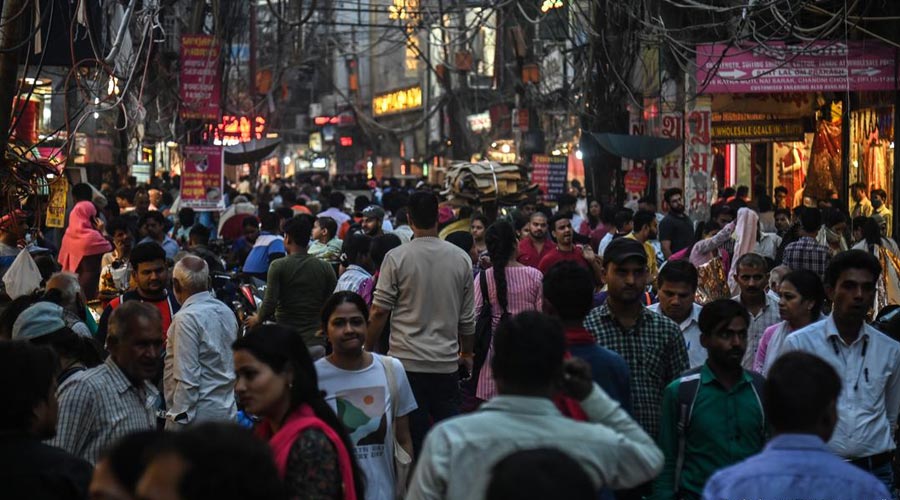According to UN estimates, which are based on census data, birth and death rates, India now has a population of at least 1,425,775,850 people, or 1.425 billion to put it more simply. It's the first time since the UN began keeping records in 1950 that China has been knocked off the top spot.
Yet the news has not been universally greeted as a sign of India's growing status as a global power.
Chinese foreign ministry spokesperson Wang Wenbin controversially suggested that while India might now have more people, China still had more "talent."
In Germany, news magazine Der Spiegel responded to the news with a cartoon showing an exaggeratedly overcrowded and ramshackle "Indian" train overtaking a slick, 21st Century "Chinese" high-speed train.
Many politicians and commentators in India decried the cartoon as racist. Sarvesh Kaushal, a former chief secretary of the regional Punjab government, tweeted: "Why is the developed world not missing any opportunity to hit India below its belt, and demean its people? They have a reason to worry: they are basking on old glory while dark future stares at them."
That begs the question as to what the wider significance, beyond symbolism, of India becoming the world's most populous nation is.
India's challenge in reaping the demographic dividend
Srikanth Kondapalli, professor of China studies at Jawaharlal Nehru University in New Delhi, says some of the reaction has been prejudicial and racist against India.
"We think population is an asset, not a problem," he told DW.
Pointing out that the average age in India is 27, below the global average, he said that would help the country reap a "demographic dividend."
"The basic indicators are moving ahead, our literacy is growing and our health care indicators are growing. We are the fifth largest economy in the world today, and we intend to be the third largest economy by 2030."
India has one of the fastest-growing economies in the world and the World Bank expects the country to have growth of around 6.9% for 2023. The IMF predicts an average growth rate of 6.1% for the next five years.
However, while the country's young population is often seen as an asset, high youth unemployment is also a problem.
The urban unemployment rate hit 10.1% last December, with post-pandemic layoffs adding to a growing problem. For young, well trained workers the lack of higher-paying, skilled jobs is particularly acute.
In manufacturing hubs, that has driven the unemployment rate to close to 20% in some cases.
Unemployment and inflation have become two of the major political issues in India ahead of the general election, which is due to take place in May 2024.
Kondapalli says it is clear what government policy must focus on if India is to capitalize on its growing population in the years ahead.
"Infrastructure improvement, skill development, providing opportunities for people to work, improving the work environment and working to improve the other basic indicators of human resource development," he said.
A dim view from Beijing
For China there is more than just symbolism to consider regarding India overtaking it.
Although the Chinese economy is four times as big as India's, there is sensitivity in Beijing regarding the country's declining and aging population. The number of Chinese citizens over 65 will more than double by 2050, placing a huge burden on the existing workforce.
The ruling Chinese Communist Party has introduced several measures aimed at boosting its flagging birth rate. Reaction on Chinese state media to the news of India overtaking it pointed to a degree of frustration with the situation.
"The United States is stepping up efforts to contain China's development and advocate further decoupling and found new hype points from the United Nations report," a commentary on the state media CCTV TV channel said, adding: "Such hype lacks a basic understanding of the law of population development."
The biggest, but not a superpower
Kondapalli says that while it is true that China still outranks India on key indicators such as literacy and health care, the gap is not as wide as portrayed by Beijing.
However, he emphasises that population growth does not mean superpower status is imminent for India. "You become a superpower based on GDP, based on technology, based on military power, based on soft power. No country becomes a superpower based on population," he said.
He also thinks that Beijing fundamentally differs from Delhi on this question in terms of its ideology. "India has no ambition to become a superpower. We have seen Xi Jinping mention that China wants to occupy the center stage, but no Indian leader ever said that India wants to be a superpower."
Yet one of the pillars behind China's claim to that status — being the biggest country in the world — is now gone. Once India gets used to its new status, its own ambitions might change.











